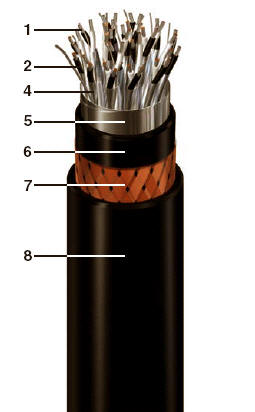Armored Cable Information

|

Compliances: Industry:
API-RP14F
CSA C22.2 No. 245 Type X110
IEEE 1580 Type P
IEC 60092-3
NEK 606 for mud oil resistance
UL 1309 Type X110
UL Listed 110°C Marine
Shipboard Cable
Flame Test:
IEEE 383
IEEE 1202
IEC 60332-3-22 Cat. A (supersedes IEC 60332-3A)
CSA C22.2 No. 0.3 FT4 |
IEEE 1580 Type P
MORâ„¢ Polyrad®XT-125
Flexible Paired Signal Cable
Individually/Overall Shielded, Armored & Sheathed
600V/1000V
Product Construction:
1. Conductor:
- 20 AWG thru 14 AWG soft annealed tinned copper flexible
strand
2. Insulation:
- Polyrad® XT-125 Irradiated Cross-Linked
Polyolefin (XLPO)
- Color Code: Black and white with printed numbers
3. Cable Core:
- Core binder tape when required
4. Individually Shielded Pairs:
- Aluminum/polymer tape and
tinned copper drain wire
5. Overall Shield:
- Overall aluminum/polymer tape with tinned
copper drain wire
6. Sheath:
- Black Irradiated Cross-Linked Chlorosulfonated
Polyethylene
7. Armor:
- Bronze braid 88% minimum coverage
8. Sheath:
- Black Irradiated Cross-Linked Chlorosulfonated
Polyethylene
9. Print: (Including but not limited to)
- MORâ„¢ POLYRAD® XT-125
(UL) E85994 BR782B 110C XX/PR XXAWG OR (CSA) 245/1309 FT4 –40C 600/1000V
OR IEC 60332.3A IEEE 1580 TYPE P OR (ETL) 109229 YEAR OF MFG SEQUENTIAL
FOOTAGE MARK
Applications:
- On offshore oil and gas drilling platforms, ships and FPSOs.
- Land-based
oil and gas drilling rigs.
- Suitable for use in Class I, Division 2 and
Zone 2 environments.
Features:
- Meets NEK 606 mud oil resistance requirements
including ester-based muds
- Meets UL 2225 crush and impact requirements
of Type MC-HL cables
- Flexible stranding to facilitate ease of cable
installation and termination
- Temperature rated @ 125°C for long life,
higher ampacities and protection from thermal overloads
- Meets cold bend
test at -55°C
- Meets cold impact test at -40°C

|
No products have been assigned to this category.
Back








